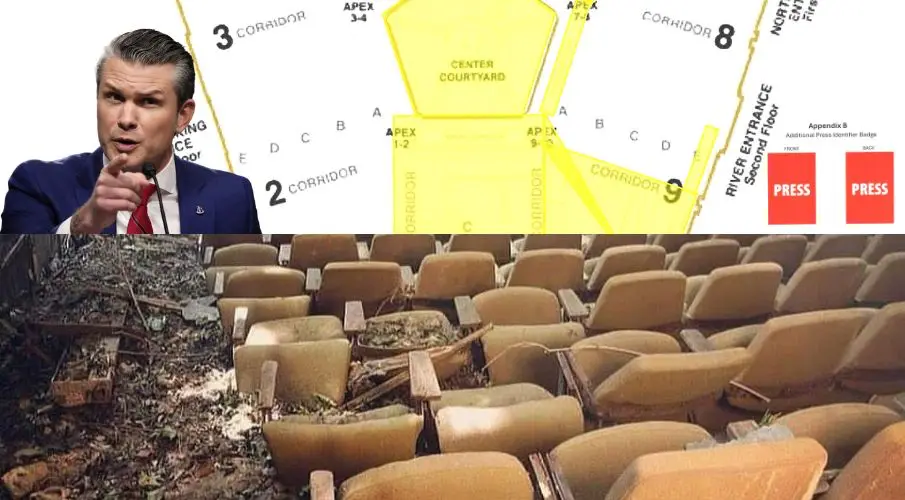In the corridors of the Pentagon, one sound echoes above all others these days: the echo of its own fear. Where journalists once reported at every step on military strategies, foreign missions, and scandals, now reigns the silence of a system that fears the truth itself. Defense Secretary Pete Hegseth, Trump’s outspoken frontman in the war against the press, has declared war on free access - with forms instead of guns. See also our article: “Every Pass a Gag Order - How the Pentagon Is Tying the Press to the Muzzle and Why Leaks May Be What Saves the Public” at the link: https://kaizen-blog.org/en/jeder-ausweis-eine-schweigepflicht-wie-das-pentagon-die-presse-an-die-sprachfessel-legt-und-warum-ausgerechnet-leaks-die-oeffentlichkeit-retten/
Anyone who still wants to pass through the doors of the Department of Defense will now have to sign a pledge not to use “unauthorized information” - even if it is completely unclassified. In other words: anyone who still wants to know something must first ask for permission. And anyone who refuses loses their pass. A new definition of “embedded journalism” - this time not on the front lines, but in the belly of the Leviathan itself. But the plan did not work. Almost all major media outlets - from CNN to Fox News to The New York Times, journalists, reporters - refused to sign. They called Hegseth’s documents what they are: a gag order wrapped in patriotism. Even Newsmax, normally a loyal wingman of the administration, found the whole thing “unnecessary and excessive.” Only One America News, the channel that regularly embellishes reality with a touch of patriotic fiction, willingly signed on. It was as if a single journalist had been handed the keys to an empty building.
Because empty is exactly what the Pentagon is now. Briefings have been suspended, the workspaces of journalists cleared out, and anyone who is still allowed to move inside the building needs an escort - preferably armed with a smile and a form. This administration calls it security. The press calls it what it is: a creeping state restructuring in which transparency is declared a threat. Hegseth himself responded to the outrage with the kind of cynicism that has long since become Washington’s preferred communication strategy. On X, the administration’s new favorite battlefield, he wrote: “The press no longer roams free. The press must wear a visible badge. The press may no longer commit crimes.” Beneath it, a waving emoji. A digital farewell salute to the Fourth Estate.

It is the logic of a power that no longer distinguishes between loyalty and control. Hegseth’s press office slightly revised the rules after tough negotiations, but the principle remained: journalists are to agree that every exchange of information causes harm - whether classified, trivial, or already public. The idea behind it is as transparent as it is dangerous: if you declare every truth a threat, you can justify every silence. Even veteran journalists who have covered the Pentagon beat for decades called it a “historic turning point.” For the first time since the 1960s, the total exclusion of critical media from the military power center looms. In the same corridors where war reporting in the Vietnam era once began, only the hum of the air conditioning remains. Transparency, once a cornerstone of military credibility, has been replaced by access cards, security zones, and the subtle art of isolation.
Investigative journalists have long been working underground
What remains is a government that sees journalism as a hostile operation. One that confuses press freedom with sabotage and reporting with betrayal. And a war minister who makes no secret of his disdain for journalists - but who seems to have forgotten that without them, there is no democracy, only decoration. “We will continue to cover the military,” the newsrooms declared in a joint statement, “with or without access.” It sounded like a vow - defiant, almost romantic - in an age when truth has once again become underground work, is often hard to sell, and many no longer realize how high the price of truth really is. We know from our own experience how hard it is to find support for investigative journalism - and how high the price can be when you truly want to make a difference, because lies are often far more entertaining.
In the Pentagon, meanwhile, it remains silent. The halls gleam, the cameras are turned off, and the room that once reflected the pulse of America’s security apparatus now looks like an expensive set for a film long since finished. The walls know more than they are allowed to say. And perhaps that is precisely the principle: whoever sees nothing cannot betray. Whoever knows nothing cannot ask. And whoever writes nothing - stays.
Investigative journalism requires courage, conviction – and your support.
Please also strengthen our journalistic fight against right-wing populism and human rights violations. We do not want to finance ourselves through a paywall so that everyone can read our research – regardless of income or origin. Thank you very much!


Ich bin positiv überrascht, dass auch Sender, wie FOX,sich dieser Anordnung von Hegseth nicht beugen wollen.
Ein Fünkchen Hoffnung.
Aber Eure Arbeit ist jnbezahlbar, Rainer.
Danke dafür
ich danke dir
Danke für die Aufklärung! Da bleibt einem die Spuke weg…..
vielen dank, und ja, es ist immer etwas los